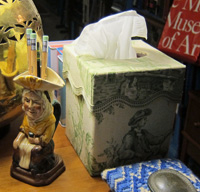
When I was writing yesterday about John Armstrong’s civilization book, I wanted to follow up a reference to Kenneth Clark’s Civilisation. But where was it? It wasn’t where I thought it ought to be. Before giving up entirely, I checked a resource that I haven’t turned to in years, my Readerware database. And what do you know? Civilisation was right where Readerware said it would be. Which only goes to show — something. It shows that I haven’t been looking at Civilisation much, or it probably would have drifted to another shelf. Most of the locations given in the database are not current. Bringing Readerware up to date is going to be a big job.Â
I gave up on Readerware because its interface was so kludgy. Well, that was part of it. The library was one of many, many things that were neglected when I began blogging in late 2004. It wasn’t until 2009, in fact, that I felt that I oughtn’t to have to spend quite so much time on the Web sites; I took up cooking again, for example. But the Readerware experience was rebarbative. It was so unlike Microsoft Access, which I’d used for about fifteen years until the files were lost in a malware crash in 2003. It had the look of something that wasn’t designed for a computer. But when Jason, my tech adviser, asked me to take a look at it a few weeks ago — I felt that I was ready to take up bookhandling again — I noticed that, unlike Version 2.0, Version 3.03 actually looks like a Windows database. I was not happy to hear Jason point out that Readerware is still the most popular private library-management application, but after a moue of regret, I thought, why not — I’ve already input information about thousands of books.
Then a month went by without my doing anything, so that no sooner was I fiddling with a get-reacquainted session the other day than the free-trial period expired, and I couldn’t access the files until the upgrade 3.03 was paid for and properly installed. The application needed to be loaded onto the laptop as well, and it made sense to store the database on the NAS server that enables me to work with Quicken and iTunes and all of my photographs from either of two computers. Jason took care of all of that. Just before he left today, I got out the bar-code scanner and swept Armstrong’s book into the database. Its location, tentatively, is “TBFP” — a pile, nearly four feet tall, of books that I’ve read in the past six months. I’m in no hurry to shelve them, because the pile compensates so nicely for the stacks of books that I haven’t read. Also, when people ask, “What have you been reading lately,” and I draw a deer-in-headlights blank, I can check out the TBFP.Â
I’m in the mood to re-read Middlemarch, but I can’t find the Oxford Classics clothbound edition that Kathleen read not too long ago. What happened to it when she was done? Chissà . I almost popped into Barnes & Noble at lunchtime to pick up another copy, but was able to resist the impulse. There is plenty of other stuff to read right now. I got through another chapter of Wilhelm Genazino’s little novel, The Shoe Tester of Frankfurt. I’ve already mentioned my suspicion that this book reads much better in German, a hunch based on the original title, Ein Regenschirm für diesen Tag — “an umbrella for this day.” Yesterday, I came across the line in the text. The narrator is at a dinner party. He has just been downsized in his shoe-testing work, so when another guest asks him what he does, he tells her that he runs an Institute for the Art of Memory and Experience. Frau Balkausen is intrigued, and asks “what kind of people I deal with at the Institute.”Â
The people who come to us, I answer, a little hesitantly and at the same time as if it were routine, are people who sense that their lives !have become nothing more than one long drawn-out rainy day, and that their bodies are no more than the umbrella for this day.
Which certainly made me reconsider the novel’s many strange erotic encounters, many of which had triggered the “ew” reflex. More than ever convinced that Regenschirm (as I’ve taken to calling it) is one of those books that just doesn’t translate very well, I went to Amazon.de and bought a copy. My German isn’t really good enough to assess the quality of Genazino’s prose, but yesterday’s chapter transformed his novel from a chore into a charm.Â
Meanwhile, I’m listening to my favorte Savoy operas round and round. As at the end of my last G & S jag, Patience is my favorite of the lot. There is something very pure and refined about the silliness in Patience — as befits a spoof of pre-Raphaelite aestheticism. The speedy concision with which Patience and Grosvenor fall in and out of romantic bliss takes my breath away.Â
Patience: And it is possible that you condescend to love such a girl as I?
Grosvenor: Yes, Patience, is it not strange? I have loved you with a Florentine fourteenth-century frenzy for full fifteen years!
Patience: Oh, marvellous! I have hitherto been deaf to the voice of love. I seem now to know what love is! It has been revealed to me — it is Archibald Grosvenor!
Grosvenor: Yes, Patience, it is!
Patience: (as in a trance) We will never, never part!
Grosvenor: We will live and die together!
Patience: I swear it!
Grosvenor: We both swear it!
Patience: (recoiling from him) But — oh, horror!
Grosvenor: What’s the matter?
Patience: Why, you are perfection. A source of endless ecstasy to all who know you!
Grosvenor: I know am am. Well?
Patience: Then, bless my heart, there can be nothing unselfish in loving you!
Grosvenor: Merciful powers! I never thought of that!
Patience: To monopolize those features on which all women love to linger! It would be unpardonable!
Grosvenor: Why, so it would! Oh, fatal perfection, again you interpose between me and my happiness!
The rapdily-unfolding absurdity works the additional magic of preserving Grosvenor’s thoroughgoing fatuosness from becoming irritating. But there’s an underlying alchemy, and John Pemble describes it brilliantly in his review of Carolyn Williams’s new book, Gilbert and Sullivan: Gender, Genre, Parody (London Review of Books, 33/12, page 39).Â
Gilbert communicated no real sense of chaos or panic because the instability of the world his characters inhabit is corrected by the stability of the language they speak. Lunatic logic and accelerating disorder are checked by metrical and elocutionary discipline.Â
Which doesn’t mean that Gilbert’s lines are fussy. They’re just perfect. Consider the encounter of Phyllis, in Iolanthe, with the two nobleman to whom she offers herself when she discovers Strephon’s “infidelity” (and doesn’t believe, yet, that “the lady is his mother!”):
Lord Mountararat: Phyllis! My darling!
Lord Tolloller: Phyllis! My own!
Phyllis: Don’! How dare you? Oh, but perhaps you’re the two noblemen I’m engaged to?
Lord Mountararat: I am one of them.
Lord Tolloller: I am the other.
Phyllis: Oh, then, my darling! (to Lord Mountararat) My own! (to Lord Tolloller) Well, have you settled which it’s to be?
Lord Tolloller: Not altogether. It’s a difficult position. It would be hardly delicate to toss up. On the whole we would rather leave it to you.
Phyllis: How can it possibly concern me? You are both Earls, and you are both rich, and you are both plain.
“How can it possibly concern me,” asks the Arcadian shepherdess about her marital destiny. It doesn’t seem crazy so much as candid: a gallery of the coldly ambitious girls that Trollope described so much more convincingly than his heroines lines up behind her.
And then there’s the music. In his slightly fannish dual biography, Gilbert and Sullivan — this is one serious jag — Michael Ainger points to why Sullivan’s serious compositional projects were never as captivating as his Savoy work. Sullivan was basically a highly gifted playboy, a fun- and sun-seeker who could dash off engaging, even knowledgeable trifles in a series of all-nighters. A friend, John Goss, responded to his cantata, The Prodigal Son, with a caution.Â
He praised his conducting, thought his orchestrations superb, and hoped Sullivan would try another oratorio, but he sounded a note of warning: “putting out all your strength — but not the strength of a few weeks or months, whatever your immidate friends may say.” Sullivan would never be capable of that long, sustained work. He preferred short, intensive bursts, followed by long periods of inactivity.Â
Inactivity at the piano, that is.
Putting away Ian Bradley’s annotated edition of the G & S librettos, I see that I’ve acquired a new bookcase since I stopped updating Readerware. (I’ve acquired two, actually.) Putting the book back was a good occasion to update its location. Very easily done!












